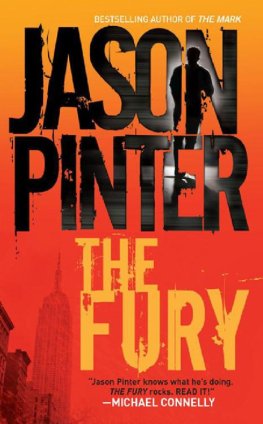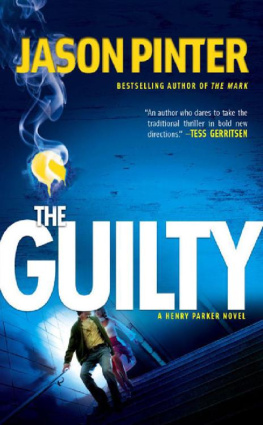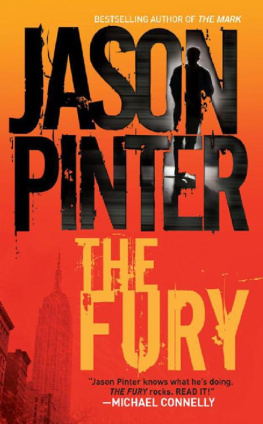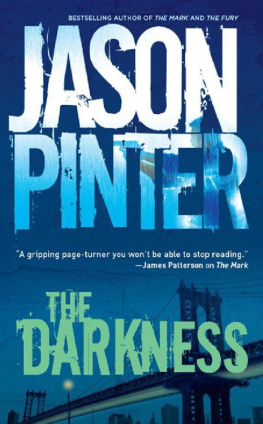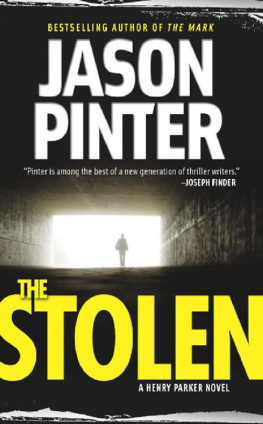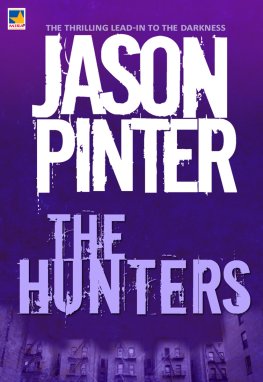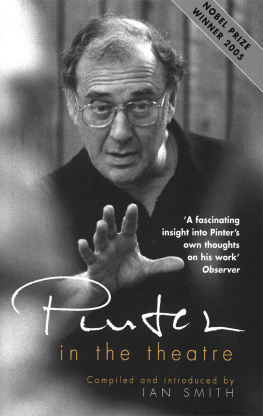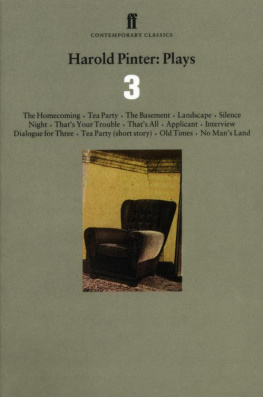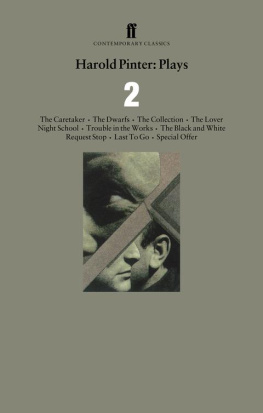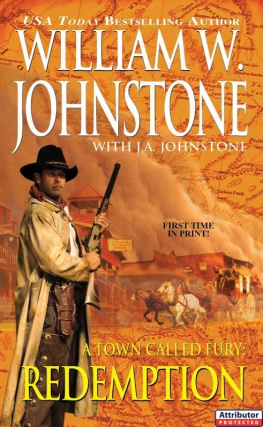Jason Pinter - The Fury
Here you can read online Jason Pinter - The Fury full text of the book (entire story) in english for free. Download pdf and epub, get meaning, cover and reviews about this ebook. genre: Detective and thriller. Description of the work, (preface) as well as reviews are available. Best literature library LitArk.com created for fans of good reading and offers a wide selection of genres:
Romance novel
Science fiction
Adventure
Detective
Science
History
Home and family
Prose
Art
Politics
Computer
Non-fiction
Religion
Business
Children
Humor
Choose a favorite category and find really read worthwhile books. Enjoy immersion in the world of imagination, feel the emotions of the characters or learn something new for yourself, make an fascinating discovery.
- Book:The Fury
- Author:
- Genre:
- Rating:4 / 5
- Favourites:Add to favourites
- Your mark:
- 80
- 1
- 2
- 3
- 4
- 5
The Fury: summary, description and annotation
We offer to read an annotation, description, summary or preface (depends on what the author of the book "The Fury" wrote himself). If you haven't found the necessary information about the book — write in the comments, we will try to find it.
The Fury — read online for free the complete book (whole text) full work
Below is the text of the book, divided by pages. System saving the place of the last page read, allows you to conveniently read the book "The Fury" online for free, without having to search again every time where you left off. Put a bookmark, and you can go to the page where you finished reading at any time.
Font size:
Interval:
Bookmark:
Jason Pinter
The Fury
Beware the fury of a patient man.
- -John Dryden1
At nine in the morning, the offices of the New York
Gazette are quiet. Reporters read the morning papers, prepare to call their sources and blink off hangovers over steaming cups of coffee. Today, however, it was a different kind of quiet. The kind of quiet where everyone seems to be waiting for the roof to cave in, or the floor to suddenly give way and fall out from under you.
Every morning I would swipe my ID card, wave hello to the security guards who'd gradually warmed to me over the years and wait for the elevator with lots of other people who also looked like they'd rather still be in bed. I would exit the elevators at the twelfth floor, passing the receptionist, always too busy to acknowl edge staffers, and walk to my desk. The offices of the
New York Gazette towered over Rockefeller Center, giving me a panoramic view of one of the busiest streets in the city. Yet when I navigated the mess of chairs and debris and entered the cubicle farm on this day, I noticed the other journalists who shared my row were nowhere to be seen. There were no faces hunched far too close to computer screens, no whispered chats about the ump teenth death knell sounded for our industry. No report ers haggling over verb usage and tense like it was a matter of life or death. It seemed every day across our industry there were more layoffs, more cutbacks, more reasons to fear the end. And it had been drilled repeat edly into us by our corporate overlords and the media that if the sickle wasn't already lancing the air above our heads, it was in the midst of being lowered into place.
I couldn't worry about that. Still a few years shy of thirty, it had been my lifelong ambition to work at a pre stigious, thriving newspaper. And while one could debate whether the Gazette was thriving, in my short time here I'd had the chance to work alongside some of the greats, including my idol, Jack O'Donnell.
I'd also been wanted for murder and targeted by a deranged serial killer. Hey, who doesn't complain about their job sometimes?
Externally, you might think I looked the same. Inter nally, though, I was a different man. A man learns who he is when his life, innocence and freedom are chal lenged. I was stronger than I ever knew I could be, but deep down I wished I hadn't needed to find that out.
When I navigated the maze of empty desks to arrive at mine, I put my coffee and muffin on the desk, sat down and debated whether to ignore the silence or see what was causing the sound vacuum. I reached for the plastic tab on my coffee, but immediately thought twice.
To ignore the strange stillness of the office would have gone against every bone in my body, and probably trig gered some sort of spontaneous combustion. Curiosity not only killed the cat, but made my breakfast grow cold. So I stood back up and took a lap around the news floor to see what the hell was going on.
I didn't have to go far.
A group of half a dozen reporters were huddled around the desk of Evelyn Waterstone, the Gazette 's
Metro editor. They were talking under their breaths, worried looks in their eyes. I wondered if there were going to be layoffs. If some of my colleagues-perhaps even myself-would be out of a job. That Evelyn's desk had seemingly replaced the watercooler as center of office scoop was itself noteworthy. Evelyn stayed as far away from gossip as those who gossiped stayed away from her. Whatever happened had to be big enough to pique her interest. I walked up casually, inserting myself into the conversation through proximity alone.
Evelyn Waterstone was a short, squat woman whose haircut resembled a well-manicured putting green- only this particular green was gray with age-and whose broad shoulders would have been a welcome addition to most offensive lines. She was a discipli narian in the gentlest sense of the word. It took several years for her to warm up to me, but when my work ethic and the quality of my reporting became clear, Evelyn began to grudgingly show me a modicum of respect.
Still, I don't think you'd ever see the two of us tossing back a couple of longnecks after hours. I made an effort never to stop by her desk unless I had a specific question, and Evelyn never stormed by mine unless I'd made some terrible grammatical mistake that, to
Evelyn, was only slightly worse of an offense than treason.
"Morning, Parker," Evelyn said. She held a black thermos between her fleshy hands, and took a long, drawn-out sip. "Another beautiful day at your friendly local newspaper." She sniffed the air. "Glad to see you've begun showering regularly again."
"Morning, Evelyn," I said, nodded to the other re porters, who offered the same.
"You hear about Rourke?" she said. I hadn't, and told her so. She raised her arms dramatically as if re counting some heroic tale. "This paper's most contro versial sportswriter-who incidentally once told a linebacker he would 'whup his ass like a donkey'-got mugged yesterday on his way home from the office.
Well, I shouldn't say mugged, because the guy didn't take any money, but Frank ended up getting the donkey side of the whupping."
"Really?" I said, incredulous. "Rourke?" I had no love lost for Frank Rourke, considering the man had once left a bag of excrement on my desk-but the man's swagger seemed to come from years of always being the one guy who was able to leave the fight on his own two feet.
"Seems some hothead took umbrage to Frank's calling the Yankees 'the most poorly run organization since FEMA.' Some disgruntled asshat from the Bronx.
Anyway, this guy waits outside of the office until Frank leaves. Then he yells, 'Yo, Rourke!' Frank turns his head, and gets a sockful of quarters up against the side of his temple."
"That's terrible, is he okay?"
"Concussion, he'll be fine. Police arrested the fan,
I'm just hoping he might have damaged the area of Frank's brain that makes him such an asshole. Maybe he'll have one of those Regarding Henry kind of epiphanies and come back a better man."
"That's probably too much to expect."
"We can dream, Parker. We can dream."
As we chatted, I noticed another group of reporters huddled together in the hallway looking like they'd just been told management had decided to restructure by throwing them out the twelfth floor windows. The group shifted nervously, whispering amongst themselves.
Never wanting to be the last one in the know, I ap proached, said, "I thought Frank was going to be fine, what gives?"
Jonas Levinson, the Gazette 's science editor, said,
"Frank is the least of our concerns. Though, as a matter of fact, something has died this morning. Something to be mourned as long as we're employed by this godfor saken newspaper. As of today, good taste, my friend, has kicked the bucket."
I stared at Jonas, waiting for some kind of an expla nation. Levinson was a tall man, balding, who wore a different bow tie to the office every day. He very seldom exaggerated his feelings, so at Jonas's remark a flock of butterflies began to flutter around in my stomach.
"I'm not following you," I said to Jonas. "Good taste? Jonas, care to explain?"
"Just follow the eyes, Parker," Jonas said. "Follow the eyes."
I opened my mouth to ask another question, but then
I realized what he was saying. The eyes of every member of our group were focused on two individuals making their way across the Gazette 's floor. They were stopping at every desk, popping into each office for a few moments. It looks like some sort of introduction ritual was taking place.
Immediately this struck me as odd. I'd never met another employee during a walkaround, and had not received one myself. The fact that this one person was being given the grand tour made it clear he was someone the brass wanted to coddle.
Font size:
Interval:
Bookmark:
Similar books «The Fury»
Look at similar books to The Fury. We have selected literature similar in name and meaning in the hope of providing readers with more options to find new, interesting, not yet read works.
Discussion, reviews of the book The Fury and just readers' own opinions. Leave your comments, write what you think about the work, its meaning or the main characters. Specify what exactly you liked and what you didn't like, and why you think so.

